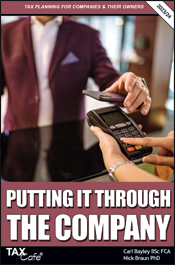New Filing Deadlines
& Penalties
Companies House: Tax Penalties and Deadlines
DON’T LET the new Companies House filing deadlines and increased penalties catch you out or you could end up a lot poorer – at a time when every penny counts!
The latest information can be found in our guide:
Putting It Through the Company
After several years of using the same accounts filing deadlines, Companies House has decided to make these deadlines shorter and, at almost the same time, vastly increase the penalties for late filing. Talk about kicking people when they’re down!
All the new deadlines and penalties applying to private companies also apply to Limited Liability Partnerships (LLPs).
Filing Deadlines
The deadlines for filing accounts at Companies House have been reduced as follows:
Old Rules New Rules
Private companies 10 months after year end 9 months after year end
PLCs 7 months after year end 6 months after year end
The new deadlines apply to any company accounting periods commencing after 5th April 2008. For example, the filing deadline for a private company’s accounts for the year ended 30th April 2009 is 31st January 2010.
An earlier deadline sometimes applies to a company’s first set of accounts – this often catches out new company directors.
The deadline here is the earlier of the normal deadline, as described above, or 21 months from the date of incorporation (22 months where the company was incorporated before 6th April 2008). For example, if you set up (incorporated) your company on 12th May 2008 and drew up your first set of accounts to 30th September 2009, the filing deadline for those accounts would be 12th February 2010, regardless of when the company commenced trading.
Late Filing Penalties
The draconian new penalty regime for late filing has already kicked in. The penalties for private companies were increased on 1st February 2009 as follows:
Old Rules New Rules
Up to 1 month late £ 100 £ 150
Over 1 and up to 3 months late £ 100 £ 375
Over 3 and up to 6 months late £ 350 £ 750
Over 6 and up to 12 months late £ 500 £1,500
More than 12 months late £1,000 £1,500
The penalties even apply to dormant companies (another way that directors are often caught out) and still higher penalties apply to public limited companies (PLCs).
Even worse, if you are late in filing your company’s accounts for two successive years under the new regime, then the penalty will be doubled in the second year.
Another sting in the tail is that, as from 1st October 2009, any accounts returned for amendment will no longer qualify for the 14 day grace period for refiling.
You should also think carefully before you dissolve a company where accounts remain outstanding, as increased penalties will apply if you later wish to resurrect it.
As if all that wasn’t enough, Companies House can also prosecute the directors of a company which fails to file its accounts on time, with an additional personal penalty of up to £5,000 applying on conviction.
As you can see, being just one day late in filing your accounts could end up being a very costly mistake indeed.
Postal Problems
Lodging your accounts via the Royal Mail could also be a costly mistake. In the recent postal strike, for example, Companies House took the quite appalling attitude that no allowance would be made for accounts (or anything else for that matter) received late – unlike their colleagues at HM Revenue and Customs, who made allowances for items delayed in the post!
This stance suits Companies House as they are trying to encourage companies to lodge accounts and other forms electronically. At present, companies can lodge abbreviated and dormant accounts electronically using XBRL (eXtensible Business Reporting Language) format. From the summer of 2010, Companies House will be adding iXBRL (inline eXtensible Business Reporting Language) format to enable unaudited accounts to be lodged electronically. It is hoped that all the main types of accounts, including audited accounts, can be lodged electronically from the summer of 2011. HM Revenue and Customs is also hoping to introduce an iXBRL service for the lodgement of accounts shortly.
Electronic filing is optional for the time being but is set to become mandatory in the near future, possibly as soon as 2011. You may want to plan ahead and sign up for electronic lodgement now in order to avoid future headaches, especially if you think more postal strikes will arise.
To register for electronic filing, go to www.companieshouse.gov.uk, you will then be sent a security code (by e-mail) and an authentication code (by post to the company’s registered address). Accounts, annual returns and other forms can then be lodged electronically.
The only compensation in all this is that Companies House and HM Revenue and Customs will also be setting up a joint filing facility in the near future, so at least you should only have to file your accounts once.




